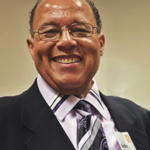

Education Civil Rights for Today and Beyond – Podcast Episode 147 | Classnotes Podcast 147
Podcast: Play in new window | Download


In particular, he outlines five priorities that the U.S. Department of Education has for the nation’s network of equity assistance centers: My Brother’s Keeper initiative, teacher equity plans, parent involvement, discipline guidance and dropout prevention.
Bradley is interviewed by Aurelio M. Montemayor, M.Ed., IDRA senior education associate.
Show length: 13:28
Send comments to podcast@idra.org
Sign up for Classnotes e-mail alerts.
Resources
Improving Public Education Accountability Systems and Addressing Educational Equity
Eleven of our nation’s most prominent national civil rights organizations released a strong statement in October 2014 to support new investments in the public schools
http://www.washingtonpost.com/blogs/answer-sheet/wp/2014/10/28/eleven-civil-rights-groups-urge-obama-to-drop-test-based-k-12-accountability-system/
Equal Access to a Quality Education – The Civil Rights Issue of Our Generation
Dr. María “Cuca” Robledo Montecel keynote, March 29, 2011
http://www.idra.org/resource-center/equal-access-to-a-quality-education/
The Challenge of Seeing, Part II – Shaping the Sixth Generation of Civil Rights and Educational Equity
By Bradley Scott, Ph.D., IDRA Newsletter
http://www.idra.org/resource-center/the-challenge-of-seeing-part-ii/
The Challenge of Seeing – Shaping the Sixth Generation of Civil Rights and Educational Equity
By Bradley Scott, Ph.D., IDRA Newsletter
http://www.idra.org/resource-center/the-challenge-of-seeing/
Coming of Age
By Bradley Scott, Ph.D., IDRA Newsletter
http://www.idra.org/resource-center/coming-of-age/
The Fourth Generation of Desegregation and Civil Rights
By Bradley Scott, Ph.D., IDRA Newsletter
http://www.idra.org/resource-center/the-fourth-generation-of-desegregation-and-civil-rights/
Your feedback
We welcome your comments and questions to the podcast. Send an e-mail to podcast@idra.org.
Listen to every episode!
To ensure you don’t miss a single episode of IDRA Classnotes, subscribe to the podcast in iTunes, (download iTunes free if you don’t have it) or sign up to receive an e-mail alert as soon as a new show is published.



